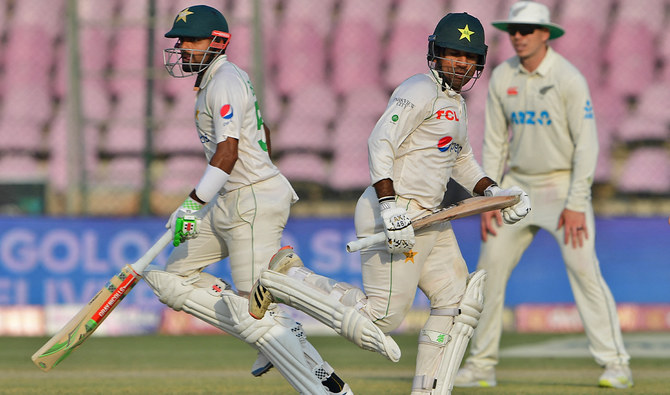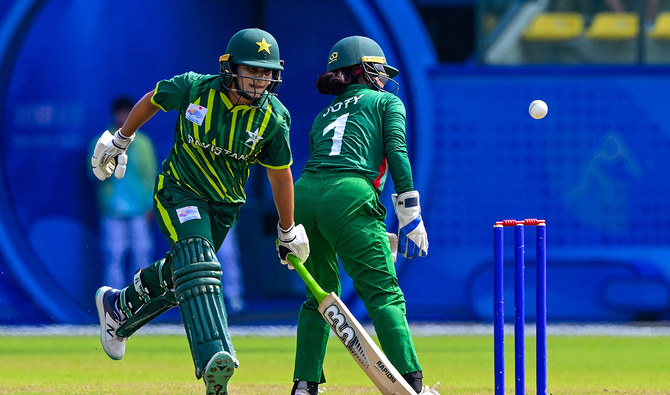KARACHI: Babar Azam hit his ninth test hundred and Sarfaraz Ahmed returned to test cricket after nearly four years with an impressive 86 as Pakistan overcame a top-order collapse to reach 317-5 against New Zealand on Monday in the first test.
Babar was not out on 161 with 16 fours and a six and Sarfaraz — playing his first test since January 2019 — grinded well in his long awaited 50th test to give Pakistan an early advantage on a slow and dry wicket.
They shared a 196-run stand to lift Pakistan from 110-4 before Ajaz Patel (2-91) broke through late in the final session on Day 1 and had Sarfaraz caught in the slip with the second new ball.
“I finally got an opportunity and I hope my today’s knock will help the team,” Sarfaraz said. “Of course it was disappointing not to get a century in my hometown, but the partnership with Babar was more important to me.”
Patel nearly ended Babar’s six hours of batting in the last over, but the Pakistan captain successfully overturned an lbw ruling through TV referral.
Babar with 1,170 runs in test matches this year, surpassed Joe Root’s tally of 1098 runs to become leading test run-scorer in 2022. His 2,584 runs in all the three formats this year bettered Pakistan’s record of most international runs in a calendar year. Pakistan batting coach Mohammad Yousuf held the previous record when he made 2,435 international runs in 2006.
Both Babar and Sarfaraz dominated the three spinners and were untroubled against the seam bowling of captain Tim Southee and Neil Wagner in nearly two sessions after New Zealand had made early inroads.
Sarfaraz came good against the spinners with his sweeps and Babar made New Zealand pay a heavy price for letting him off the hook early with his trademark cover drives and flicks on the on-side.
Daryl Mitchel dropped a regulation catch when Babar was on 12 as the Pakistan skipper raised his hundred before tea off 161 balls with a six off Michael Bracewell (2-61) over midwicket.
“Babar made the most of his chance and batted really well,” Patel said. “He continued to put pressure on us when we were starting building momentum … and he soaked it up. Obviously no one wants to drop catches, but it happens sometimes, it’s just the nature of the game.”
Babar could have been run out in the first over after lunch but Devon Conway couldn’t hit the stumps at the non-striker’s end with the Pakistan captain way out of his crease when Sarfaraz refused to go for a quick single.
New Zealand, playing its first test in Pakistan in 20 years, had started well after Babar won the toss and elected to bat on a wicket expected to favor spinners.
Patel and Bracewell made an early impact after Southee brought on his slow bowlers as early as the fourth over at National Stadium.
Sarfaraz had to wait for 26 test matches before finally breaking into the test XI after Pakistan finally rested all-format regular wicketkeeper-batter Mohammad Rizwan. He made full use of his hometown conditions and rebuilt the innings and even braved cramps after tea while going for a quick single and diving at the non-striker’s end.
New Zealand came close to dismissing Sarfaraz on 26, but the batter successfully went for a TV referral after on-field umpire Aleem Dar adjudged him to be caught behind off Southee. Southee was again on the forefront with the second new ball, but Sarfaraz survived another TV referral when New Zealand went for an unsuccessful lbw review.
Earlier, Patel and Bracewell found plenty of turn in the first hour after Southee lost the toss in his debut as New Zealand skipper. Southee read the slow and dry wicket quickly and brought on his spinners with the new hard ball only three overs old.
“At the start of the day I thought it was very really good. Later on in the day it got tougher,” Patel said. “Babar and Sarfaraz really batted very well. They really applied themselves and put us under pressure for long periods of time.”
Patel got the breakthrough off his third ball as Abdullah Shafique (7) was stumped after getting beaten on two successive deliveries from the leftarm spinner.
Shan Masood (3) also tried an over ambitious shot against Bracewell’s offspin and Tom Blundell got his second stumping before Imam-ul-Haq (24) played a reckless shot and holed out to Southee at mid-off to leave Pakistan struggling at 48-3. It was for the first time in men’s test history that first two batters in an innings got stumped.
Babar raised his fifty off 76 balls when he drove Sodhi through mid-on off the backfoot for his seventh boundary before Southee dismissed Saud Shakeel (22) in the penultimate over before lunch.
Shakeel, who scored four half-centuries in England’s 3-0 sweep against Pakistan last week, played a loose drive against Southee and offered a regulation catch in the gully just when it looked the pair had started to rebuild the innings.
Pakistan also brought Mir Hamza into the playing XI after the leftarm fast bowler played his only test against Australia in 2018 in Abu Dhabi, while Imam also returned after missing the last test against England because of a hamstring injury.

















